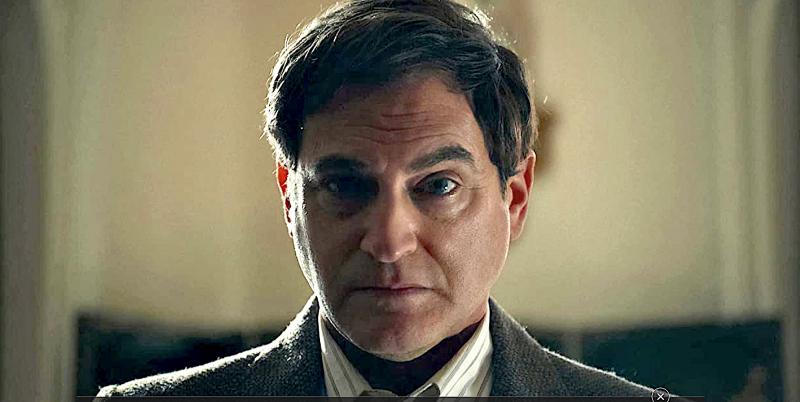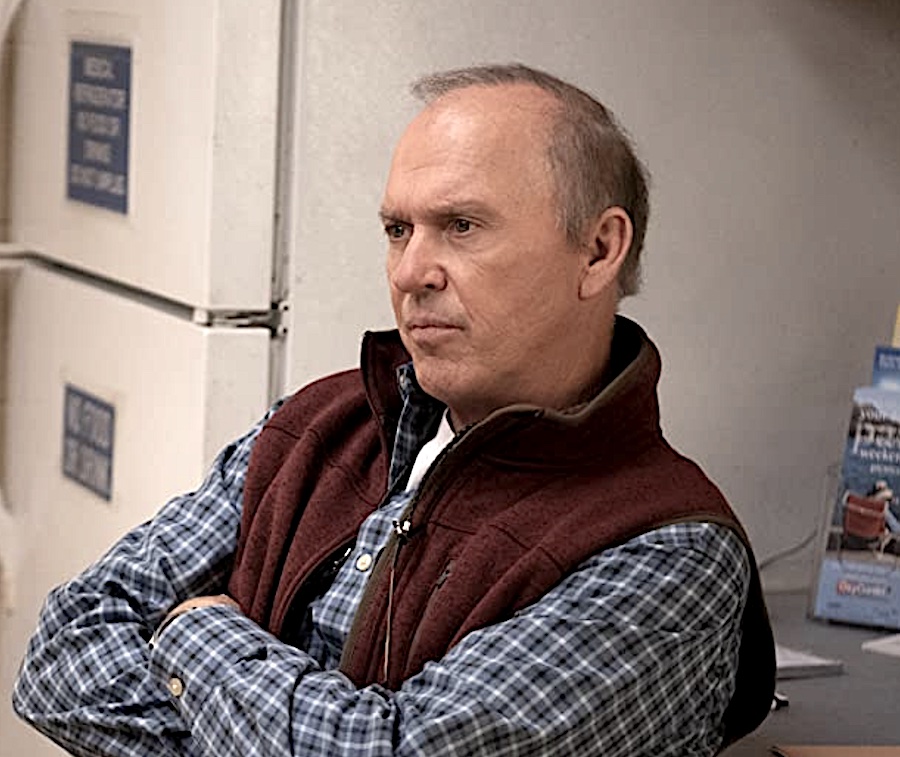Dopesick, Disney+ review - the harrowing inside story of America's OxyContin scandal | reviews, news & interviews
Dopesick, Disney+ review - the harrowing inside story of America's OxyContin scandal
Dopesick, Disney+ review - the harrowing inside story of America's OxyContin scandal
How corporate greed rode roughshod over regulatory oversight

“Drug companies are supposed to be honest,” says a lady from the Department of Justice, explaining why the US Food and Drug Administration had been treating the pharmaceutical industry with a light, indeed barely detectable, regulatory touch.
Dopesick is the story of how the chickens came home to roost when the unscrupulous drugs monolith Purdue launched its painkilling drug OxyContin on an unsuspecting American public, and from the mid-1990s into the 2000s set in motion one of the most devastating health scandals in medical history.
 Based on the book by Beth Macy, Dopesick: Dealers, Doctors and the Drug Company that Addicted America (how’s that for a tight, snappy title?), Dopesick achieves the none-too-easy feat of converting a fact-packed real-life story into a series that binds together strands of convincing human drama while never losing its grip on the overarching story. Creator Danny Strong has assembled a cross-section of characters – including Kentucky doctor Samuel Finnix (Michael Keaton, pictured above), Justice Department agents Rick Mountcastle and Randy Ramseyer (Peter Saarsgard and John Hoogenakker), DEA agent Bridger Meyer (Rosario Dawson) and young coal miner Betsy Mallum (Kaitlyn Dever) – through which different dimensions of the saga are channelled. As the Purdue company cynically shapes its marketing and promotional campaigns, selling OxyContin as a super-painkiller which, miraculously, is the only opioid ever invented that isn’t addictive, the sinister Sackler dynasty which owns the company looms ominously in the background.
Based on the book by Beth Macy, Dopesick: Dealers, Doctors and the Drug Company that Addicted America (how’s that for a tight, snappy title?), Dopesick achieves the none-too-easy feat of converting a fact-packed real-life story into a series that binds together strands of convincing human drama while never losing its grip on the overarching story. Creator Danny Strong has assembled a cross-section of characters – including Kentucky doctor Samuel Finnix (Michael Keaton, pictured above), Justice Department agents Rick Mountcastle and Randy Ramseyer (Peter Saarsgard and John Hoogenakker), DEA agent Bridger Meyer (Rosario Dawson) and young coal miner Betsy Mallum (Kaitlyn Dever) – through which different dimensions of the saga are channelled. As the Purdue company cynically shapes its marketing and promotional campaigns, selling OxyContin as a super-painkiller which, miraculously, is the only opioid ever invented that isn’t addictive, the sinister Sackler dynasty which owns the company looms ominously in the background.
Michael Stuhlbarg is in award-winning form with his portrayal of Richard Sackler, a cold-blooded, mercilessly ambitious tycoon who seems to convince himself of his own righteousness even while he’s deliberately bending the facts and tilting the playing field to suit his own megalomaniac ambitions. Lax FDA regulations permitted Purdue to get away with a string of outrageous claims, such as the unproven assertion that fewer that one per cent of OxyContin users would become addicted to it. In this telling, the company conned doctors and members of the public into thinking they were making a generic public service bulletin about painkillers, called “I got my life back”, then sneakily repackaged it as an OxyContin commercial.
Company salesman Billy Cutler (Will Poulter) becomes the embodiment of Purdue’s sell-at-all-costs approach, badgering Dr Finnix to attend Purdue’s all-expenses-paid five-star weekends in a luxury resort in Scottsdale, Arizona. The way Finnix, a conscientious doctor who works tirelessly to help his local community, is seduced by Purdue’s blandishments into becoming a shill for OxyContin is painful to behold. The victims of what proves to be an extremely addictive and damaging product are often poor working people like Betsy Mallum (the drug earned itself the nickname “hillbilly heroin”), who suffers chronic pain from an injury sustained in her mining work (Kaitlyn Dever as Betsy, pictured below). At first, OxyContin’s painkilling properties seem like a blessing from above, until Betsy finds she has lapsed into crippling addiction.
 The sheer brazenness of Purdue’s sales tactics is gobsmacking. They devised nifty little catchlines like “Pain is the fifth vital sign” – alongside blood pressure, heart rate etc – to legitimise the mass adoption of their product, as if not to use it would almost be a crime. They came up with the hitherto unknown condition of “Breakthrough Pain” to describe pain that defied OxyContin’s anaesthetic effects. Their solution? Double the dosage! This sent sales and profits soaring, almost as quickly as it created new swathes of Oxy addicts, which spread out from mining and logging communities to sweep across the USA. Thefts, bankruptcies, homelessness and the fatal physical and mental effects of opioid dependency duly followed in its wake.
The sheer brazenness of Purdue’s sales tactics is gobsmacking. They devised nifty little catchlines like “Pain is the fifth vital sign” – alongside blood pressure, heart rate etc – to legitimise the mass adoption of their product, as if not to use it would almost be a crime. They came up with the hitherto unknown condition of “Breakthrough Pain” to describe pain that defied OxyContin’s anaesthetic effects. Their solution? Double the dosage! This sent sales and profits soaring, almost as quickly as it created new swathes of Oxy addicts, which spread out from mining and logging communities to sweep across the USA. Thefts, bankruptcies, homelessness and the fatal physical and mental effects of opioid dependency duly followed in its wake.
This isn’t a fun ride, but the performances are uniformly powerful and Dopesick’s meticulous production values create a powerful aura of verisimilitude. Its warnings about power-crazed corporate greed and the ability of industrial giants to evade necessary scrutiny are more urgent now than ever.
The future of Arts Journalism
You can stop theartsdesk.com closing!
We urgently need financing to survive. Our fundraising drive has thus far raised £49,000 but we need to reach £100,000 or we will be forced to close. Please contribute here: https://gofund.me/c3f6033d
And if you can forward this information to anyone who might assist, we’d be grateful.

Subscribe to theartsdesk.com
Thank you for continuing to read our work on theartsdesk.com. For unlimited access to every article in its entirety, including our archive of more than 15,000 pieces, we're asking for £5 per month or £40 per year. We feel it's a very good deal, and hope you do too.
To take a subscription now simply click here.
And if you're looking for that extra gift for a friend or family member, why not treat them to a theartsdesk.com gift subscription?
more TV
 theartsdesk Q&A: director Stefano Sollima on the relevance of true crime story 'The Monster of Florence'
The director of hit TV series 'Gomorrah' examines another dark dimension of Italian culture
theartsdesk Q&A: director Stefano Sollima on the relevance of true crime story 'The Monster of Florence'
The director of hit TV series 'Gomorrah' examines another dark dimension of Italian culture
 The Monster of Florence, Netflix review - dramatisation of notorious Italian serial killer mystery
Director Stefano Sollima's four-parter makes gruelling viewing
The Monster of Florence, Netflix review - dramatisation of notorious Italian serial killer mystery
Director Stefano Sollima's four-parter makes gruelling viewing
 The Diplomat, Season 3, Netflix review - Ambassador Kate Wyler becomes America's Second Lady
Soapy transatlantic political drama keeps the Special Relationship alive
The Diplomat, Season 3, Netflix review - Ambassador Kate Wyler becomes America's Second Lady
Soapy transatlantic political drama keeps the Special Relationship alive
 The Perfect Neighbor, Netflix review - Florida found-footage documentary is a harrowing watch
Sundance winner chronicles a death that should have been prevented
The Perfect Neighbor, Netflix review - Florida found-footage documentary is a harrowing watch
Sundance winner chronicles a death that should have been prevented
 Murder Before Evensong, Acorn TV review - death comes to the picturesque village of Champton
The Rev Richard Coles's sleuthing cleric hits the screen
Murder Before Evensong, Acorn TV review - death comes to the picturesque village of Champton
The Rev Richard Coles's sleuthing cleric hits the screen
 Black Rabbit, Netflix review - grime and punishment in New York City
Jude Law and Jason Bateman tread the thin line between love and hate
Black Rabbit, Netflix review - grime and punishment in New York City
Jude Law and Jason Bateman tread the thin line between love and hate
 The Hack, ITV review - plodding anatomy of twin UK scandals
Jack Thorne's skill can't disguise the bagginess of his double-headed material
The Hack, ITV review - plodding anatomy of twin UK scandals
Jack Thorne's skill can't disguise the bagginess of his double-headed material
 Slow Horses, Series 5, Apple TV+ review - terror, trauma and impeccable comic timing
Jackson Lamb's band of MI5 misfits continues to fascinate and amuse
Slow Horses, Series 5, Apple TV+ review - terror, trauma and impeccable comic timing
Jackson Lamb's band of MI5 misfits continues to fascinate and amuse
 Coldwater, ITV1 review - horror and black comedy in the Highlands
Superb cast lights up David Ireland's cunning thriller
Coldwater, ITV1 review - horror and black comedy in the Highlands
Superb cast lights up David Ireland's cunning thriller
 Blu-ray: The Sweeney - Series One
Influential and entertaining 1970s police drama, handsomely restored
Blu-ray: The Sweeney - Series One
Influential and entertaining 1970s police drama, handsomely restored
 I Fought the Law, ITVX review - how an 800-year-old law was challenged and changed
Sheridan Smith's raw performance dominates ITV's new docudrama about injustice
I Fought the Law, ITVX review - how an 800-year-old law was challenged and changed
Sheridan Smith's raw performance dominates ITV's new docudrama about injustice
 The Paper, Sky Max review - a spinoff of the US Office worth waiting 20 years for
Perfectly judged recycling of the original's key elements, with a star turn at its heart
The Paper, Sky Max review - a spinoff of the US Office worth waiting 20 years for
Perfectly judged recycling of the original's key elements, with a star turn at its heart

Add comment